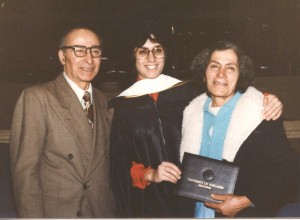When we remember, we keep our loved ones alive. They will live as long as we reflect upon our memories of them. If we have pleasant memories, we’ll hold them in our hearts. If not, we try to forget.
It’s been 31 years since my mother died on April Fools’ Day [Try to Remember—Living On in One’s Heart and Memory] and 23 years since my father died after being diagnosed with Alzheimer’s. When I look carefully for the silver lining among the clouds of loss, I feel fortunate my father died earlier in 2001, before the 9/11 Terrorist Attacks upon the United States. My father would have been traumatized by the scenes that unfolded. Had my mother lived beyond the early 1990s, and with what we know today about vascular dementia, she would have likely been diagnosed with dementia. Instead, her heart stopped beating before age 72.
The Irony
I spent only a few years with my parents when I consider how many years, I’ve been alive. Yet, these were my formative years. Who I am, my values, and even my beliefs are a result of their upbringing. They may have disagreed due to my rebellious nature. But I, the youngest of three, felt emboldened to challenge their perceptions of the world. I questioned them regularly. Why?
Despite all the time that has passed since those 18 formative years of my life, I think of them daily.
Return to the Home of My Youth?
Some, choose to return home to the place they were raised. Sometimes, this occurs due to necessity. A family member steps up to care for Mom or Dad in their home. Depending on the family caregiver’s situation, their parent’s home is where they stay after Mom or Dad passes.
Unlike them, I moved my father from his Wisconsin home to California after he was diagnosed with dementia. Currently, I have no desire to return to my birthplace to live. First, Wisconsin’s winters are cold. Yes, snowy days are both beautiful and magically peaceful. During the other seasons, clouds move slowly across the sky, sometimes teasing a too little sun. Will I visit? Yes. Second, I don’t have enough pleasant memories of my formative years. The joyful moments were punctuated by overwhelming struggles at home, at school, among friends, and trying to fit in as a dark-haired daughter of immigrants among fair-skinned people.
How would my parents react?
 Still, with life’s dramatic twists and turns, I sometimes wonder how my parents would react.
Still, with life’s dramatic twists and turns, I sometimes wonder how my parents would react.
Mostly, my parents projected courage upon their three children.
They worked hard. Very hard. For the first fifteen years of my life, my father worked two factory jobs as a machinist to shore up his retirement benefits. By the time I turned 15, he retired since he was older when I was born. My mother kept busy around the house. She even spearheaded the paving of our driveway with discarded granite bricks that once lined the streets of old Milwaukee.
Sadly, in my mother’s later years, she chose to live as a martyr. I have very few pictures of her—this, from the early 1980s being one of the last. I would think living during the Armenian genocide was enough of a price to pay of suffering. She didn’t take care of herself. She neglected her eyes. I don’t need glasses. Her teeth caused her much pain. Pull them all out. And eventually her heart that loved all manner of plant (she was an avid gardener), animal (she comforted stray animals), and human was growing larger as the weakened muscle eventually stopped pumping life-giving blood.
Greater Irony
We caregivers can still reflect upon our memories. This means we keep our loved ones alive in our minds and our hearts. However, these loved ones who live with dementia stop remembering. If they live long enough, they lose their ability to recognize family members. They struggle to find the words.
While they forget, we remember.
After they pass, we keep them alive in our memories.
Also read: Has it been THAT long?








